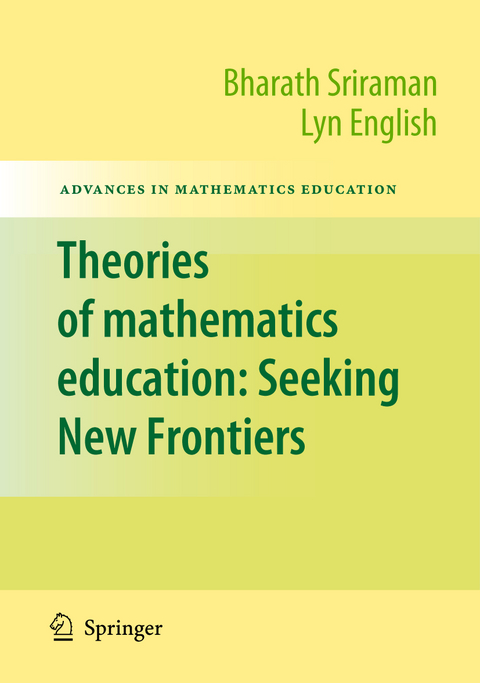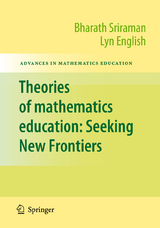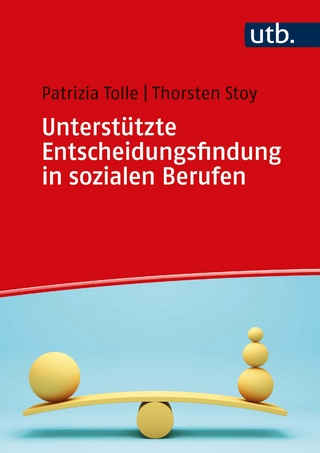Theories of Mathematics Education
Springer Berlin (Verlag)
978-3-642-00741-5 (ISBN)
I.- Preface to Part I.- Surveying Theories and Philosophies of Mathematics Education.- II.- Preface to Part II Ernest's Reflections on Theories of Learning.- Reflections on Theories of Learning.- Commentary 1 on Reflections on Theories of Learning by Paul Ernest.- Commentary 2 on Reflections on Theories of Learning.- III.- Preface to Part III.- On the Theoretical, Conceptual, and Philosophical Foundations for Research in Mathematics Education.- Commentary on On the Theoretical, Conceptual, and Philosophical Foundations for Research in Mathematics Education.- IV.- Preface to Part IV.- Theories of Mathematics Education: Is Plurality a Problem?.- Commentary on Theories of Mathematics Education: Is Plurality a Problem?.- V.- Preface to Part V.- Re-conceptualizing Mathematics Education as a Design Science.- Commentary 1 on Re-conceptualizing Mathematics Education as a Design Science.- Commentary 2 on Re-conceptualizing Mathematics Education as a Design Science.- Commentary 3 on Re-conceptualizing Mathematics Education as a Design Science.- VI.- Preface to Part VI.- The Fundamental Cycle of Concept Construction Underlying Various Theoretical Frameworks.- Commentary on The Fundamental Cycle of Concept Construction Underlying Various Theoretical Frameworks.- VII.- Preface to Part VII.- Symbols and Mediation in Mathematics Education.- Commentary on Symbols and Mediation in Mathematics Education.- VIII.- Problem Solving Heuristics, Affect, and Discrete Mathematics: A Representational Discussion.- Commentary on Problem Solving Heuristics, Affect, and Discrete Mathematics: A Representational Discussion.- IX.- Preface to Part IX.- Problem Solving for the 21 Century.- Commentary 1 on Problem Solving for the 21 Century.- Commentary 2 on Problem Solvingfor the 21 Century.- X.- Preface to Part X.- Embodied Minds and Dancing Brains: New Opportunities for Research in Mathematics Education.- Commentary on Embodied Minds and Dancing Brains: New Opportunities for Research in Mathematics Education.- XI.- Preface to Part XI.- DNR-Based Instruction in Mathematics as a Conceptual Framework.- Commentary on DNR-Based Instruction in Mathematics as a Conceptual Framework.- XII.- Appreciating in Qualitative Research.- XIII.- Preface to Part XIII.- Understanding a Teacher's Actions in the Classroom by Applying Schoenfeld's Theory : Reflecting on Goals and Beliefs.- Commentary on Understanding a Teacher's Actions in the Classroom by Applying Schoenfeld's Theory : Reflecting on Goals and Beliefs.- XIV.- Preface to Part XIV.- Feminist Pedagogy and Mathematics.- Commentary 1 on Feminist Pedagogy and Mathematics.- Commentary 2 on Feminist Pedagogy and Mathematics.- Commentary 3 on Feminist Pedagogy and Mathematics.- XV.- Preface to Part XV.- Networking of Theories-An Approach for Exploiting the Diversity of Theoretical Approaches.- Commentary on Networking of Theories-An Approach for Exploiting the Diversity of Theoretical Approaches.- XVI.- Preface to Part XVI.- On Networking Strategies and Theories' Compatibility: Learning from an Effective Combination of Theories in a Research Project.- Modalities of a Local Integration of Theories in Mathematics Education.- Commentary on On Networking Strategies and Theories' Compatibility: Learning from an Effective Combination of Theories in a Research Project.- Commentary on Modalities of a Local Integration of Theories in Mathematics Education.- XVII.- Preface to Part XVII.- Complexity Theories and Theories of Learning: Literature Reviews andSyntheses.- XVIII.- Preface to Part XVIII.- Knowing More Than We Can Tell.- Commentary on Knowing More Than We Can Tell.- XIX.- Politicizing Mathematics Education: Has Politics Gone too Far? Or Not Far Enough?.- Commentary on Politicizing Mathematics Education: Has Politics Gone too Far? Or Not Far Enough?.
From the reviews:
"Theories of Mathematics Education: Seeking New Frontiers is the first book in the series titled 'Advances in Mathematics Education.' The book contains 20 chapters, 16 prefaces, and 23 commentaries ... . if you are interested and ready to join, as a listener, an interesting and informative conversation among the leaders in the field of ME, to follow their contemplations and become exposed to their arguments and disagreements, then this book will provide you with plenty." (Roza Leikin and Rina Zazkis, Journal for Research in Mathematics Education, Vol. 43 (2), March, 2012)
"The series intends to 'integrate, synthesize, and extend' work in the field so that promising ideas can be improved and built upon. The seed for this inaugural book was the 2005 meeting of the International Group of the Psychology of Mathematics Education. ... The ultimate test of the value of the ideas in this book is whether they or their progeny help solve the problems that teachers, administrators, and policymakers face as they work to improve mathematics teaching and learning." (Kristin L. Umland, The Mathematical Intelligencer, Vol. 33 (2), March, 2011)
"Book addresses much more, including teachers' pedagogical actions and the politicization of mathematics education, and offers an intriguing look at covert ways of knowing. ... provides vocabularies to use, pronouncements to respond to, and examples to consider for researchers and graduate students who wish to discuss what MER theory is and should be. For these reasons, the book will be of most interest to expert, novice, and aspiring researchers who are using, crafting, refining, or reflecting upon theories for their own current and future research." (Robert Ely, Educational Studies in Mathematics, May, 2010)
"I like this book!! It is the flagship book announcing a new Springer series Advances in Mathematics Education, and as such it does a wonderful jobintroducing readers to the field, at the same time laying it out clearly and extending it in many different directions. It provides a valuable perspective on the field. ... a valuable resource for anyone interested in learning about the many facets of the field. ... I highly recommend it for the library of any serious mathematics education researcher." (Libby Knott, Mathematics Education Research Journal, Vol. 22 (3), 2010)
"Volume is organized into 19 parts, each of which, after the initial overview ... typically contains a brief preface, a substantial essay, and from one to three commentaries on the essay. ... This is an excellent format ... suited for discussions of theory. ... researchers will find themselves provoked to react to various perspectives; those embarking on their careers will find introductions to a wide range of areas. All will be provoked to react, and that ... is a fitting reward for reading the book." (Alan H. Schoenfeld, ZDM Mathematics Education, Vol. 42, 2010)
| Erscheint lt. Verlag | 3.11.2009 |
|---|---|
| Reihe/Serie | Advances in Mathematics Education |
| Zusatzinfo | XXX, 668 p. 34 illus. |
| Verlagsort | Berlin |
| Sprache | englisch |
| Maße | 155 x 235 mm |
| Gewicht | 1162 g |
| Themenwelt | Mathematik / Informatik ► Mathematik |
| Sozialwissenschaften ► Pädagogik ► Erwachsenenbildung | |
| Sozialwissenschaften ► Pädagogik ► Schulpädagogik / Grundschule | |
| Schlagworte | Complexity • Mathematica • Mathematics • mathematics education • Modeling • Philosophy • Problem Solving |
| ISBN-10 | 3-642-00741-4 / 3642007414 |
| ISBN-13 | 978-3-642-00741-5 / 9783642007415 |
| Zustand | Neuware |
| Haben Sie eine Frage zum Produkt? |
aus dem Bereich




